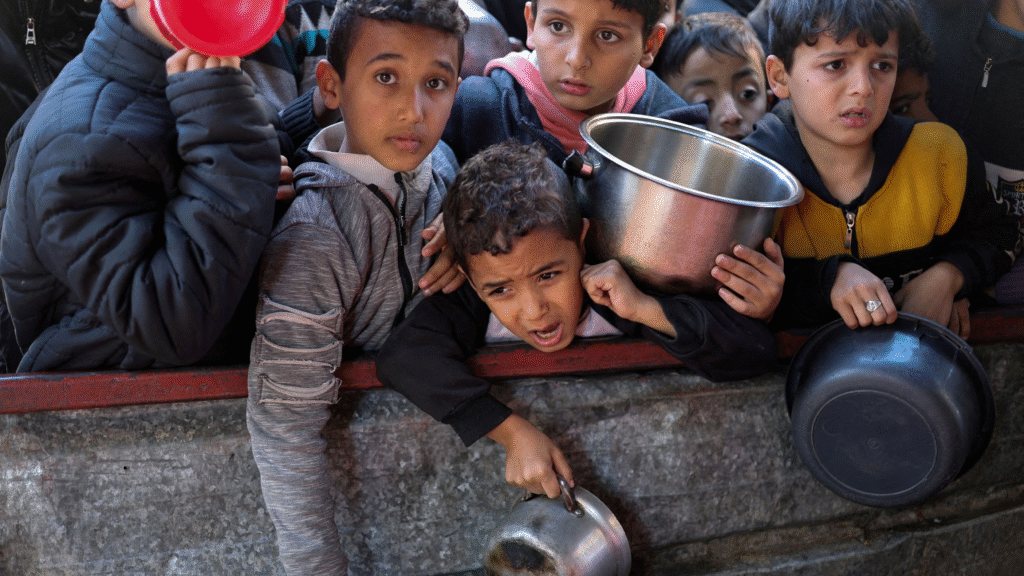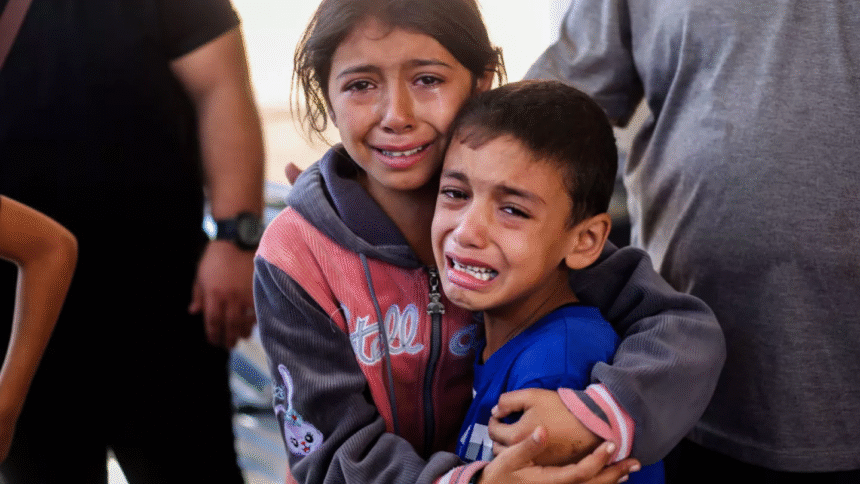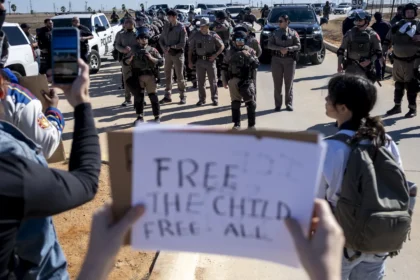Gaza Crisis: Save the Children Warns Thousands of Kids Too Malnourished to Cry Amid Ongoing War
Save the Children reports Gaza’s children are so malnourished they can’t cry, exposing a deepening humanitarian crisis amid war
The head of Save the Children delivered a harrowing account on Wednesday of the suffering endured by children in Gaza, describing how malnutrition has left them so weak they cannot even cry.
Addressing the UN Security Council, Inger Ashing, president of the international charity, said famine, officially declared by the UN last week, is far more than a technical term.

“When there is not enough food, children become acutely malnourished, and then they die slowly and painfully. This, in simple terms, is what famine is,” Ashing told diplomats.
She painted a grim picture of how starvation slowly destroys the body: first consuming fat stores, and then muscle and vital organs.
“Yet our clinics are almost silent. Now, children do not have the strength to speak or even cry out in agony. They lie there, emaciated, quite literally wasting away,” Ashing said.
Aid groups have long warned that famine was looming, citing ‘Israel’s’ restrictions on food and essential supplies entering Gaza since October 2023.
“Everyone in this room has a legal and moral responsibility to act to stop this atrocity,” Ashing added.
The UN formally declared famine in Gaza on Friday, pointing to what it called systematic obstruction of aid by ‘Israel’ over the course of the 22-month assault.

According to the UN-backed Integrated Food Security Phase Classification Initiative (IPC), 500,000 people in the Gaza governorate, including Gaza City, are currently facing famine conditions, roughly one-fifth of the territory’s population. The IPC warned that famine could affect up to two-thirds of Gaza by the end of September.
Israel called the report “fabricated” on Wednesday and demanded the IPC retract it.
Following the Security Council meeting, 14 of 15 members, all except the United States, issued a joint statement expressing “profound alarm and distress” over the famine declaration, affirming their trust in the IPC’s findings.
“The use of starvation as a weapon of war is clearly prohibited under international humanitarian law. Famine in Gaza must be stopped immediately,” the statement said.
The humanitarian situation in Gaza has reached catastrophic levels, with Save the Children reporting that thousands of children are now too malnourished to even cry. This harrowing revelation underscores the worsening plight of civilians in the war-torn enclave, where months of relentless conflict, shortages of food, and limited humanitarian access have pushed families to the brink of survival.
According to aid workers, children arriving at overcrowded hospitals and makeshift shelters are showing signs of severe acute malnutrition, a life-threatening condition where the body is deprived of essential nutrients. Medical staff describe heartbreaking scenes of infants who lack the energy to cry, a stark indicator of critical weakness and deterioration.
Save the Children noted that thousands of families are skipping meals daily, while some parents resort to eating less so their children can have even a small portion of food. With supply chains crippled by the ongoing conflict and limited humanitarian convoys permitted entry, malnutrition has become one of the gravest threats facing Gaza’s youngest citizens.

Hospitals in Gaza are struggling to cope. Already devastated by bombings and overwhelmed with war casualties, the health system is now buckling under the growing number of malnutrition-related cases. Doctors warn that they are running out of essential medicines, baby formula, and therapeutic foods needed to treat starving children.
International health agencies estimate that tens of thousands of children under the age of five are at risk of famine-like conditions. Without immediate intervention, the consequences could be fatal for an entire generation.
“No child should ever be too weak to cry. The situation in Gaza is a stain on humanity. Unless urgent and unfettered aid reaches families, we risk losing countless innocent lives.”
Parents describe heartbreaking choices, with some forced to give dirty water to their children due to the lack of clean drinking supplies. The spread of waterborne diseases has only compounded the crisis, placing already malnourished children at higher risk of death.
The international community has expressed grave concern. The United Nations, World Health Organization (WHO), and several humanitarian groups have called for immediate humanitarian corridors to deliver food, medical aid, and clean water. However, political and security blockades have hindered large-scale relief efforts.
Humanitarian experts emphasize that aid must be consistent and large-scale, not just symbolic. Food assistance, clean water supplies, and specialized treatment for malnutrition are urgently needed to prevent Gaza from descending into a full-blown famine.
The situation in Gaza is not just a humanitarian crisis but a moral test for the world. Children—who bear no responsibility for the conflict—are suffering the most. The haunting image of infants too weak to cry encapsulates the depth of this tragedy.
As Save the Children warns, unless urgent action is taken, Gaza risks losing an entire generation to hunger, disease, and war. The time for global solidarity, humanitarian access, and sustained aid delivery is now.








